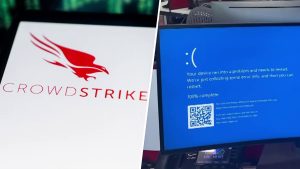In an unprecedented digital disruption, a global tech outage on Friday, July 19, 2024, brought countless computer systems and businesses to a grinding halt, causing widespread chaos across various sectors. The outage, attributed to a faulty system update by cybersecurity firm CrowdStrike, affected major airlines, banks, healthcare facilities, and public transit systems worldwide.
CrowdStrike, a prominent U.S. cybersecurity company used by over half of Fortune 500 companies, acknowledged that a defect in one of its recent content updates impacted Microsoft’s Windows Operating System. The company’s CEO, George Kurtz, apologized for the disruptions in an interview with NBC’s Today, emphasizing that the incident was “not a security incident or cyberattack.”

The ripple effects of this digital disaster were felt across the globe, with air travel being one of the hardest-hit sectors. In the United States alone, hundreds of flights were canceled, leaving thousands of passengers stranded. Major carriers such as American Airlines, Delta Air Lines, and United Airlines were forced to ground flights, causing significant delays and cancellations that persisted throughout the day.
At Indira Gandhi International Airport in New Delhi, the scene was one of utter chaos. Around 100 flights were canceled, and more than 300 experienced delays. Passengers reported long queues and frustrating wait times as airport staff resorted to manual processes for check-ins, baggage handling, and issuing boarding passes.
The outage’s impact extended far beyond air travel. In the United Kingdom, the London Stock Exchange faced disruptions, while major train delays left commuters stranded. British broadcaster Sky News was temporarily forced off the air, adding to the communication breakdown.
Public transit systems in major U.S. cities also felt the heat. The Washington Metropolitan Area Transit Authority reported that its website and some internal systems were down, although trains and buses continued to run as scheduled. Similarly, in New York City, the Metropolitan Transportation Authority experienced temporary outages in its customer information systems.
The healthcare sector was not spared either, with medical facilities in Europe and the United States forced to cancel some services due to the tech breakdown. This raised serious concerns about the vulnerability of critical infrastructure and the potential risks to patient care during such widespread outages.
As businesses and organizations scrambled to implement contingency plans, the incident highlighted the fragility of our increasingly interconnected digital world. Ann Johnson, head of Microsoft’s security and compliance business, described the scale of the outage as “massive,” noting that hundreds of engineers were working directly with CrowdStrike to restore affected systems.
The U.S. Cybersecurity and Infrastructure Security Agency reported that hackers were attempting to exploit the outage for phishing and other malicious activities, adding another layer of concern to an already dire situation.
Wall Street felt the tremors of the tech meltdown, with the main indexes falling and the Cboe Volatility index, known as Wall Street’s “fear gauge,” hitting its highest level since early May. The widespread disruption unnerved investors, leading to a sell-off driven by tech stocks and mixed earnings.
As the day wore on, CrowdStrike announced that the issue had been identified, isolated, and a fix deployed. Microsoft also confirmed that the underlying cause had been addressed, though residual impacts were expected to affect some Microsoft 365 apps and services.
In an unexpected twist, Krispy Kreme sought to sweeten the sour situation by offering customers a free Original Glazed doughnut from 5-7 p.m. local time on Friday. The company’s Instagram post quipped, “Sweet-ware update available! Does technology have you down today? Our windows are working great and so is our Hot Light.”
As systems gradually came back online and operations began to normalize, questions lingered about the long-term implications of such a widespread outage. Industry analysts questioned whether control over operationally critical software should remain concentrated in the hands of a few companies, while others emphasized the need for more robust contingency plans and better back-up systems.
The global tech meltdown of July 19, 2024, served as a stark reminder of our increasing dependence on digital infrastructure and the potential for cascading failures in our interconnected world. As businesses and organizations work to clear backlogs and recover from the disruption, the incident has sparked a renewed focus on building resilience into our critical systems. In the aftermath of this digital debacle, one thing is clear: in our tech-driven world, even a small glitch can lead to a global switch-off.

